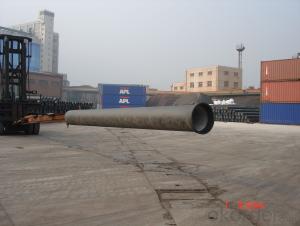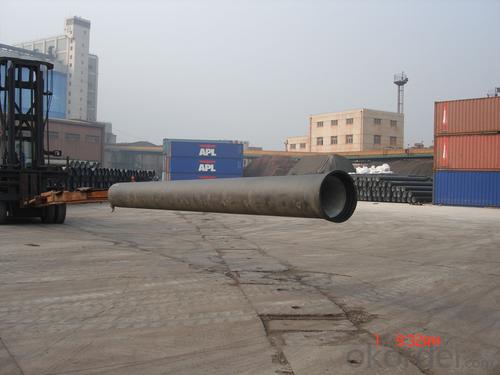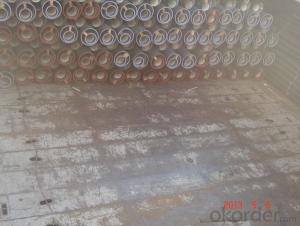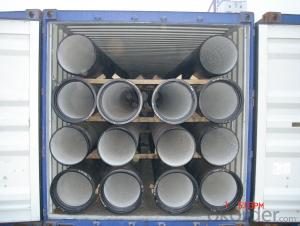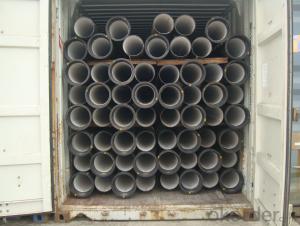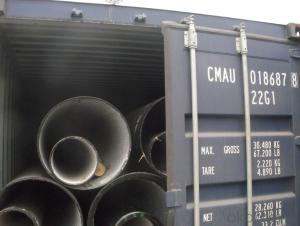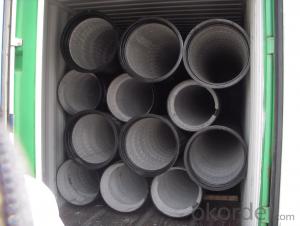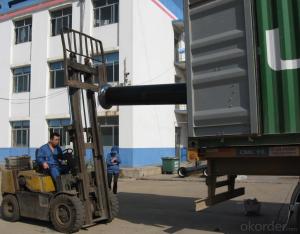DUCTILE IRON PIPE AND PIPE FITTINGS C CLASS DN800
- Loading Port:
- Tianjin
- Payment Terms:
- TT OR LC
- Min Order Qty:
- 23 pc
- Supply Capability:
- 3000 pc/month
OKorder Service Pledge
OKorder Financial Service
You Might Also Like
· Material : Ductile Cast Iron
· Size Range : DN 80mm to DN 2000mm
· Unit Effective Length : 6m or 5.7m
· Manufacture Standard: ISO 2531:1998/ EN 545:2006/EN 598:2007
· Annual capacity : 200,000 tons
· Coating Exterior: Zinc 130g/m2 according to ISO 8179-1 and bitumen coating 70 microns.
· Cement Interior: Portland Cement/ High Alumina Cement/ Sulphate Resisting Cement Lining according to ISO 4179
· Special requirements on external coating and internal lining can be applied
· We also provide accessories such as SBR/EPDM rubber gaskets, lubricant paste, pipe caps, PE sleeves, etc.
Additional Parts:
Each pipe is strictly inspected according to related standard to ensure permanently high performance.
Easy Installation at site and service free for life
Long Service Lifespan
Quotation will arrive you within 24hours once we get your inquiry.
We guarantee offering you a competitive price.
A copy of original inspection reports of pipes will be offered after shipment.
Photos of loading process will be sent to the customer after shipment effect.
We will follow-up the delivery progress after shipment effect and update to the customer on weekly basis.
- Q: Can ductile iron pipe be used for trenchless installation methods?
- Yes, ductile iron pipe can be used for trenchless installation methods. Trenchless installation methods, such as pipe bursting or horizontal directional drilling, are suitable for various pipe materials including ductile iron. Ductile iron pipes are known for their strength, durability, and flexibility, making them suitable for trenchless methods where the pipe needs to be installed without an open trench.
- Q: What are the different pressure classes available for ductile iron pipe?
- The different pressure classes available for ductile iron pipe include Class 100, Class 150, Class 200, Class 250, Class 300, Class 350, and Class 400.
- Q: What is the maximum allowable joint deflection for ductile iron pipes?
- Industry standards and guidelines typically specify the maximum allowable joint deflection for ductile iron pipes. These standards can vary depending on the specific application and local regulations. Typically, the maximum allowable joint deflection for ductile iron pipes is limited to a range of 1% to 5% of the pipe diameter. This means that the pipe can tolerate a deflection of up to 1% to 5% of its diameter without causing significant damage or compromising its structural integrity. However, it is important to consider factors such as pipe size, wall thickness, and operating conditions as these can affect the exact maximum allowable joint deflection. For specific guidelines on the maximum allowable joint deflection for ductile iron pipes in a given application, it is recommended to consult relevant industry standards like those published by the American Water Works Association (AWWA) or the International Organization for Standardization (ISO).
- Q: Can ductile iron pipes be used for water supply networks?
- Indeed, water supply networks can utilize ductile iron pipes. Renowned for their robustness and endurance, ductile iron pipes are adept at transporting water across extensive distances. Their resistance to corrosion, ability to withstand high pressure and external forces, render them a dependable option for water supply systems. Furthermore, the smooth internal surface of ductile iron pipes diminishes friction and facilitates efficient water flow. Consequently, due to their exceptional performance and longevity, ductile iron pipes have gained global popularity in water supply networks.
- Q: What is the relationship between the direction of the spigot and the direction of the flow in the ductile iron pipe?
- Called "ductile" (Ductile Cast Iron Pipes), referred to as ball pipe, ductile iron pipe and ductile iron pipe etc..
- Q: Can ductile iron pipes be used for water supply in buildings?
- Yes, ductile iron pipes can be used for water supply in buildings. Ductile iron pipes are known for their strength, durability, and corrosion resistance, making them suitable for carrying water in both residential and commercial structures. They have a long lifespan, high pressure rating, and can withstand various environmental conditions, making them a reliable choice for water distribution systems.
- Q: Can ductile iron pipes be used for underground mining applications?
- Yes, ductile iron pipes can be used for underground mining applications. Ductile iron is a strong and durable material that can withstand the harsh conditions and heavy loads associated with mining operations. It has excellent resistance to corrosion and is able to handle high pressure and temperature environments. Additionally, ductile iron pipes are flexible and can be easily installed and maintained, making them suitable for underground mining applications where mobility and adaptability are important. Overall, ductile iron pipes are a reliable and cost-effective choice for underground mining operations.
- Q: Are ductile iron pipes suitable for industrial applications?
- Yes, ductile iron pipes are highly suitable for industrial applications. Ductile iron is a strong and durable material that possesses excellent mechanical properties, making it ideal for handling high-pressure and heavy-duty applications. The pipes have a high tensile strength and can withstand extreme conditions, including high temperatures and corrosive environments. Furthermore, ductile iron pipes have superior resistance to cracking and fracturing, ensuring a longer lifespan and reduced maintenance costs. They are also highly resistant to external loads, making them suitable for underground installations and industrial settings where they may be subjected to heavy loads or vibrations. Moreover, ductile iron pipes have excellent flow characteristics due to their smooth interior surface, allowing for efficient fluid transportation in industrial systems. They also have good resistance to wear and abrasion, ensuring a consistent flow rate over time. Additionally, ductile iron pipes are versatile and can be used in various industrial applications such as water supply, wastewater treatment, industrial processes, and mining operations. They are available in a wide range of sizes to accommodate different requirements and can be easily connected using various jointing methods. Overall, ductile iron pipes offer the reliability, strength, and longevity required for industrial applications, making them a suitable choice for industries where durability and performance are crucial.
- Q: Can ductile iron pipe be used for power plant cooling water systems?
- Yes, ductile iron pipe can be used for power plant cooling water systems. Ductile iron pipe is known for its strength, durability, and corrosion resistance, making it a suitable choice for transporting water in power plant cooling systems. Additionally, its ability to withstand high pressure and temperature variations makes it a reliable option for such applications.
- Q: Can ductile iron pipes be used in mining applications?
- Ductile iron pipes are well-suited for incorporation into mining applications due to their exceptional strength and durability. Renowned for their ability to withstand rigorous environments, such as mines, ductile iron pipes offer excellent resistance to corrosion, a crucial characteristic when dealing with water or liquids that may contain chemicals or minerals. Furthermore, these pipes possess commendable impact resistance, enabling them to endure the harsh conditions commonly encountered in mining operations. Their ease of installation and maintenance further contribute to their efficiency and cost-effectiveness in mining applications. All in all, ductile iron pipes are a dependable choice for the transportation of water, slurry, or other substances within mining operations.
Send your message to us
DUCTILE IRON PIPE AND PIPE FITTINGS C CLASS DN800
- Loading Port:
- Tianjin
- Payment Terms:
- TT OR LC
- Min Order Qty:
- 23 pc
- Supply Capability:
- 3000 pc/month
OKorder Service Pledge
OKorder Financial Service
Similar products
Hot products
Hot Searches
Related keywords
